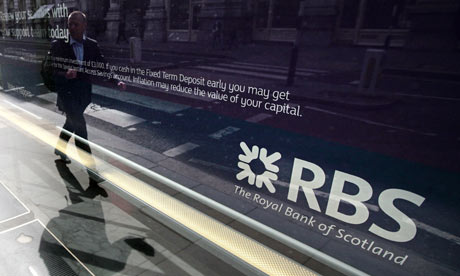We must stop protecting the rich from market forces
The 'American' global economy punishes the poor while giving handouts to failing banks. It's time for some balance

'The British government has taken over (with shares with voting rights) two of the world's biggest banks – the RBS and HBOS – but refuses to order them to do its bidding.' Photograph: Shaun Curry/AFP/Getty Images
Gore Vidal, the recently demised American writer, once famously quipped that the US economic system is "free enterprise for the poor and socialism for the rich".
Since the outbreak of the global financial crisis in 2008, not only has the US lived up to Vidal's caricature but the whole of the rich capitalist world has become more "American". The poor are increasingly exposed to market forces, with tougher conditions on the diminishing state protection they get, while the rich have unprecedented levels of protection from the state, with virtually no strings attached.
The poor are told that their states are bankrupt because their previous governments splashed out on welfare payments for them.
They – especially if they happen to be from the "lazy" Eurozone periphery countries – are lectured that they have to pay for the "good times" they had with "other people's money" by working harder at lower wages and by accepting lower levels of welfare provision, with more stringent conditions.
Of course, this narrative is completely misleading. The current budget deficits are mainly the outcomes of the fall in tax revenues caused by the financial crisis, rather than excessive social spending.
In fact, in the run-up to the crisis, countries like Spain and Ireland had run budget surpluses (for a decade, in the case of Ireland), while the deficit levels in other countries, except in Greece, were at manageable levels.
The "laziness" argument also does not wash, as most poor people work much harder than the rich in any given country, while the Greeks, the Spaniards and the Portuguese work much longer (by at least a few hundred hours per year) than the Germans or the Dutch. In contrast, the rich are enjoying unprecedented levels of protection from market forces.
Many financial and industrial companies have been bailed out with the public's money, but very few of those who had run those companies have been punished for their failures.
Yes, the top managers of those companies have lost their jobs – but with a fat pension and mostly with a handsome severance payment. None of them have been punished for gross negligence or incompetence, even when they had flatly denied there was anything wrong with their business.
The most prominent case in point is Joe Cassano – the chief financial officer of AIG, the American insurance company, who has been described as "Patient Zero of the global economic meltdown" by the journalist Matt Taibbi, who famously referred to Goldman Sachs as "vampire squid". Just six months before his company's bailout, Cassano had said: "[i]t is hard for us, without being flippant, to even see a scenario within any kind of realm of reason that would see us losing one dollar in any of the [credit default swap] transactions".
There were, to be sure, occasions when the governments punished companies for obvious wrongdoings. However, those punishments were too meek to have any corrective effect on their subsequent behaviour, in contrast to the harsh punishments meted out to benefit cheats (they used to call this "class justice" in the 19th century).
For example, in 2010, the US government fined Goldman Sachs $550m for the mis-selling of financial derivatives, but that was equivalent only to a couple of weeks' profit for the company in that year.
Not only were they not punished for their failures, the surviving financiers have been drawing large salaries and bonuses despite the fact that they are living off state protection: – guarantees for bailouts, in the case of deposit banks and other financial institutions allied with them; and monetary policy of historical laxity, which has allowed them to operate with a fat profit margin even within a generally depressed economy. And some of them have done this even when their companies were doing very poorly, defying the basic market principle of linking compensation to performance.
Moreover, even when they injected public money into failing companies, the governments made sure that they didn't apply market disciplines. When it bailed out General Motors, the US government deliberately took shares that do not have voting rights (albeit priority in dividend payouts) – so that it would not have any say in the management of the company.
The British government has taken over (with shares with voting rights) two of the world's biggest banks – the RBS and HBOS – but refuses to order them to do its bidding, as any decent capitalist would have done to a company that he/she had taken over.
While being helped by government protection to make money, the rich have also been given special allowances to keep as much of it as possible.
And while they spend significant resources tracking down and punishing welfare cheats, the governments of the rich countries do nothing to close down tax havens, which have allowed many large companies and super-rich individuals to get away with paying less than their fair shares of tax.
The spread of Vidal's "American" system, fortunately, may be meeting resistance. The recent news about the French government's injection of public money into the struggling car maker Peugeot-Citroen in return for tough conditions on the company's dividend payouts and re-investment, is a case in point.
The very fact that the French government proposal is considered unusual eloquently speaks to the absurdity of the current situation in which the rich get more and more government protection with fewer conditions, while the poor get less and less protection with increasingly demanding conditions. It is time to redress the imbalance.
Ed- Way past time to address the dictatorship of Rich irresponsible casino bosses, gambling with working class taxes.
